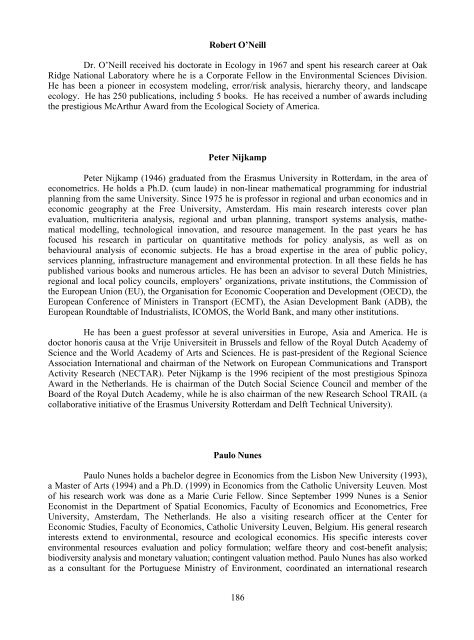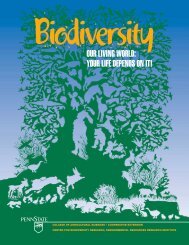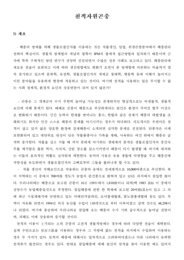Valuation of Biodiversity Benefits (OECD)
Valuation of Biodiversity Benefits (OECD)
Valuation of Biodiversity Benefits (OECD)
- No tags were found...
Create successful ePaper yourself
Turn your PDF publications into a flip-book with our unique Google optimized e-Paper software.
Robert O’NeillDr. O’Neill received his doctorate in Ecology in 1967 and spent his research career at OakRidge National Laboratory where he is a Corporate Fellow in the Environmental Sciences Division.He has been a pioneer in ecosystem modeling, error/risk analysis, hierarchy theory, and landscapeecology. He has 250 publications, including 5 books. He has received a number <strong>of</strong> awards includingthe prestigious McArthur Award from the Ecological Society <strong>of</strong> America.Peter NijkampPeter Nijkamp (1946) graduated from the Erasmus University in Rotterdam, in the area <strong>of</strong>econometrics. He holds a Ph.D. (cum laude) in non-linear mathematical programming for industrialplanning from the same University. Since 1975 he is pr<strong>of</strong>essor in regional and urban economics and ineconomic geography at the Free University, Amsterdam. His main research interests cover planevaluation, multicriteria analysis, regional and urban planning, transport systems analysis, mathematicalmodelling, technological innovation, and resource management. In the past years he hasfocused his research in particular on quantitative methods for policy analysis, as well as onbehavioural analysis <strong>of</strong> economic subjects. He has a broad expertise in the area <strong>of</strong> public policy,services planning, infrastructure management and environmental protection. In all these fields he haspublished various books and numerous articles. He has been an advisor to several Dutch Ministries,regional and local policy councils, employers’ organizations, private institutions, the Commission <strong>of</strong>the European Union (EU), the Organisation for Economic Cooperation and Development (<strong>OECD</strong>), theEuropean Conference <strong>of</strong> Ministers in Transport (ECMT), the Asian Development Bank (ADB), theEuropean Roundtable <strong>of</strong> Industrialists, ICOMOS, the World Bank, and many other institutions.He has been a guest pr<strong>of</strong>essor at several universities in Europe, Asia and America. He isdoctor honoris causa at the Vrije Universiteit in Brussels and fellow <strong>of</strong> the Royal Dutch Academy <strong>of</strong>Science and the World Academy <strong>of</strong> Arts and Sciences. He is past-president <strong>of</strong> the Regional ScienceAssociation International and chairman <strong>of</strong> the Network on European Communications and TransportActivity Research (NECTAR). Peter Nijkamp is the 1996 recipient <strong>of</strong> the most prestigious SpinozaAward in the Netherlands. He is chairman <strong>of</strong> the Dutch Social Science Council and member <strong>of</strong> theBoard <strong>of</strong> the Royal Dutch Academy, while he is also chairman <strong>of</strong> the new Research School TRAIL (acollaborative initiative <strong>of</strong> the Erasmus University Rotterdam and Delft Technical University).Paulo NunesPaulo Nunes holds a bachelor degree in Economics from the Lisbon New University (1993),a Master <strong>of</strong> Arts (1994) and a Ph.D. (1999) in Economics from the Catholic University Leuven. Most<strong>of</strong> his research work was done as a Marie Curie Fellow. Since September 1999 Nunes is a SeniorEconomist in the Department <strong>of</strong> Spatial Economics, Faculty <strong>of</strong> Economics and Econometrics, FreeUniversity, Amsterdam, The Netherlands. He also a visiting research <strong>of</strong>ficer at the Center forEconomic Studies, Faculty <strong>of</strong> Economics, Catholic University Leuven, Belgium. His general researchinterests extend to environmental, resource and ecological economics. His specific interests coverenvironmental resources evaluation and policy formulation; welfare theory and cost-benefit analysis;biodiversity analysis and monetary valuation; contingent valuation method. Paulo Nunes has also workedas a consultant for the Portuguese Ministry <strong>of</strong> Environment, coordinated an international research186












